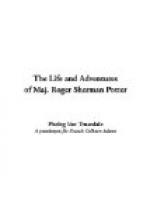The generals were not a little diverted by this speech, which I venture to assert was never excelled for originality, though many stranger addresses have been made by Commanders-in-Chief to their officers. Indeed they were not long in discovering all the weaknesses of the man, and questioned among themselves whether it were better to yield him explicit obedience or set him down for a fool and treat him accordingly. They however took their departure, promising that nothing should be left undone; in fine that his orders would be obeyed to the letter.
And when they were gone, General Potter shrugged his shoulders, and looking askant at his secretary, who had remained silent during the interview, said: “Honestly, Mr. Tickler, I would like to have your opinion respecting these gentlemen generals of mine, for they seem a set of scurvy fellows, and have much need of raiment.” Whispering, with his lips to Tickler’s ear, he continued, “and there is a flavor about them by no means agreeable. And unless I be a bad prophet, either the devil has been painting all their noses, or they have long been familiar with the bottle.”
“Faith of the saints, if your excellency would know what I think of them, it is this-that, barring you have the capacity of Wellington and Napoleon combined, you will have your hands full in keeping these generals from making war upon one another; though you may find it difficult to keep the army to their fighting when the enemy appears.”
“I have them in my power, Tickler,” replied the general, giving his head a significant toss; “and if they keep not peace between themselves then I will order them all hanged. And as the rules of the service must not be broken, I will take good care that they show me that deference due to my high position. What is more, friend Tickler, you shall be judge in all these matters, which is an honor of no mean quality; and which is here conferred upon you out of respect to your great learning.” Mr. Tickler shook his head, and stroked his beard, despondingly. “It is well enough to be judge, your excellency; but as I have a fear the honors you seem so free to lavish upon me would not keep house well with my poverty, I would prefer first to have that relieved. Do not forget that our man has fed us on stolen provisions for these three weeks,” replied Mr. Tickler. An end was put to this dialogue by the general reminding Mr. Tickler that men of great learning ought always to be patriots, since history furnished proofs enough of their great endurance under poverty.




